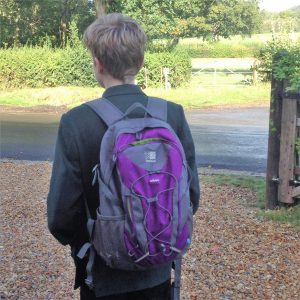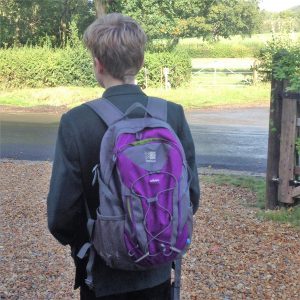

Children should ideally use a rucksack as a school bag, with straps over both shoulders.
By Michelle Carrington
How Common is Back Pain in Children?
Back pain is now the world’s leading cause of human disability, and together with related musculoskeletal conditions, accounts for a quarter of UK sickness absence. But, contrary to popular belief, back pain is not just an adult problem. One in four UK secondary school pupils have regular or daily back pain! In 2015, the UK charity BackCare surveyed 900 secondary school pupils (11-16 years) across the UK, revealing that two thirds of UK secondary school pupils have experienced back pain. One in four of them reported suffering from back pain regularly, or even daily. Neck and shoulder pain were also very common, affecting a similar number. So, what factors are contributing to this, and what can children and their parents do to help?
Dangers of Heavy School Bags
School bag burden seems to be very common and strongly linked to back pain. Half of the children surveyed by BackCare said their school bag often or always felt tiring or too heavy for them. Back pain was ten times more common amongst pupils with heavy or tiring school bags. When the weight of a child’s school bag is considered in relation to their body weight, it can sometimes be more than Health & Safety at work would allow an adult to carry.
The Health and Safety Executive advises that an adult should not lift more than 25kg unaided (from elbow height) and should not carry in excess of 10 kg for any distance. As a rough guide to what it is reasonable to expect a child to carry, this should ideally not be more than 10% of their body weight. If they are carrying as much as 20% of their body weight they are at risk of long term damage to their backs. Even distribution of the weight is important too to prevent postural muscle imbalances developing in the body. Bearing this in mind, there are a few common sense steps that can be taken to minimise the risks.
i. Use a well designed rucksack, and make use of both straps. If walking a significant distance (e.g. to and from school) use the waist strap too.
ii. Only carry what you have to. Remove books that you don’t need to reduce weight.
iii. Pack your rucksack well, with something flat against your back. Also, try to place heavier items close to your back, and/or at the bottom of the rucksack, to reduce the strain on your back.
Back Pain From Sitting
In the BackCare Survey of UK secondary school children (2015), pupils were asked to estimate the number of hours that they spend sitting every day. This included in the classroom, whilst travelling, when doing homework, and during their free time. The survey revealed that pupils sit for an average of 9 hours per day. Back pain almost doubled amongst pupils with higher than average sitting times. Another cause for concern is that other studies have linked sitting for more than 4 hours per day with increased risk of diabetes, obesity, heart disease, cancer and depression.
How To Prevent Back Pain in Children
There a 3 main ways in which parents can tackle the problem of back pain in school age children, and promote general well-being at the same time:
1. Keep your child as active as possible. Read more in our related article “Activity to Prevent Back Pain in School Children”.
2. Tell your child about the importance of good posture and ergonomics. Be mindful of reducing the weight in their school bag, providing a suitable place to study, and teaching them postural awareness. Read more in our related article “Posture: The Essentials for School Children”.
BackCare Awareness Week 2017
This year, the national back pain charity BackCare have chosen to highlight the problem of back pain in school children during BackCare Awareness Week (2-8 October 2017). At Haslemere Chiropractic Clinic we are offering FREE SPINAL CHECK-UPS to school age children, either because they have symptoms that they would like advice about, or simply to check how their spine is working. These will be available from 2 October until 31 October. We thought that it might be helpful to stretch the offer over Half Term week to make it easier to find time!
To book an appointment for your child, call Reception on 01428 642778 and ask for a “Free Screening”.
Please note that children under 16 years old will require an adult to accompany them.
